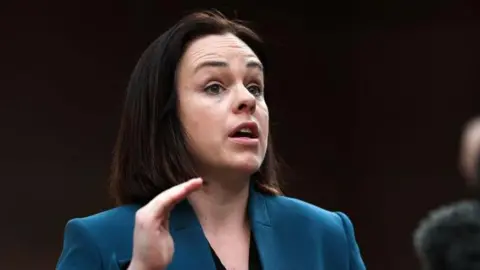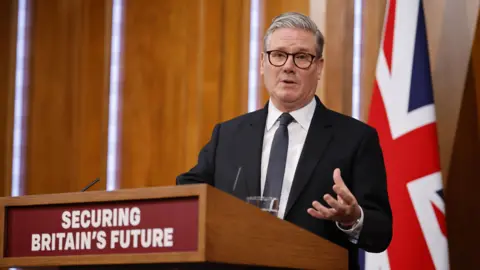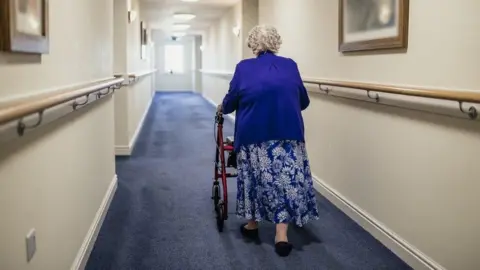Care system will suffer under UK immigration plan - Forbes
 Getty Images
Getty ImagesScotland's deputy first minister says she is in "no doubt" that the country's care system will suffer from UK government plans to tighten immigration rules.
Kate Forbes said Scotland needed to take a "distinct approach" to the rest of the UK.
It came as care home bosses claimed the immigration plans could lead to closures and longer NHS waiting lists.
Prime Minister Sir Keir Starmer said his proposals would "take back control" of UK borders.
As part of the new strategy, the Labour administration is aiming to cut the recruitment of care workers from overseas and tighten English language requirements for immigrants.
Forbes said she listened with "absolute astonishment" to reports that the UK government wanted to cut the recruitment of overseas care workers.
She told BBC Radio's Good Morning Scotland programme the proposals were "baffling" to those working in the industry.
The deputy first minister said: "I am in no doubt whatsoever that our care system is going to suffer from the changes that reportedly are going to be made today."
She said Scotland faced "demographic challenges", and that "one of the most pressing issues that investors, developers, public services tell us right now is being able to recruit a workforce".
Forbes said: "With a small population of about five million people, Scotland needs a distinct immigration system, a distinct approach to the immigration system, we have shared that with the UK government."
 EPA
EPAShe told the programme this could possibly be done using a separate "Scottish visa" - something that the UK government previously said it was not considering.
The deputy first minister also raised concerns about plans to enforce stricter standards on graduate visas "when we know so much of Scotland's economic growth has come from international students that have chosen to be based in Scotland".
Robert Kilgour, chairman of Scottish care home group Renaissance Care, said limiting overseas visas would be a "killer blow" for the industry.
Mr Kilgour, who said he had previously donated to the Conservatives, the Liberal Democrats and Labour, said a third of the 1,500 members of staff his company employs across 19 care homes come from overseas.
He told Good Morning Scotland: "We couldn't run our homes without these amazing staff.
"More care homes are going to close because of this. It'll lead to more bed-blocking, more cancellations of operations and longer waiting lists, so they are shooting themselves in both feet."
Campbell Mair, managing director of Highland Home Carers, said "retention and recruitment" of UK workers was already difficult, and called on both the UK and Scottish governments to invest more in the sector.
He said: "A workforce capacity reduction, which inevitably will arise and will occur as a result of this, will directly impact on vulnerable adults lives, those of their families and loved ones and the health economic impact will be very significant."
 Getty Images
Getty ImagesAnnouncing his plans, Sir Keir said that from 2019 to 2023 net migration "quadrupled" under the previous Conservative administration, reaching a record high of nearly one million in the year to 2023.
He said this is almost the size of the city of Birmingham, the UK's second largest city.
"That's not control, it's chaos," he told a news conference.
Under the White Paper proposals, migrants will have to spend 10 years in the UK before being able to apply for citizenship, but so-called "high-contributing" individuals such as doctors and nurses could be fast-tracked through the system.
Language requirements will be increased for all immigration routes to ensure a higher level of English.
Rules will also be laid out for adult dependants, meaning that they will have to demonstrate a basic understanding of the language.
Meanwhile, skilled worker visas will require a university degree, and there will be tighter restrictions on recruitment for jobs with skills shortages.
Sir Keir said: "Let me put it this way, nations depend on rules, fair rules.
"In a diverse nation like ours, and I celebrate that these rules become even more important without them, we risk becoming an island of strangers, not a nation that walks forward together."
John Swinney accused the prime minister of being using "divisive language" and "playing into the hands" of Reform UK leader Nigel Farage - a frequent critic of immigration policy.
On X, Swinney said: "The prime minister's statement on immigration today will damage our economy, the NHS, social care and our universities. It ignores the need to boost Scotland's working age population."
Scottish visa
Immigration is reserved to the UK government, but the SNP have long called for a bespoke Scottish scheme to meet the country's unique demographic needs.
SNP MP Stephen Gethins has tabled a bill in the House of Commons seeking an amendment to the Scotland Act 1998 to allow Holyrood ministers to set up a Scottish visa.
The proposals seem highly unlikely to win the support of Labour ministers, though the previous Labour administration at Westminster did agree to a special Scottish scheme.
Introduced by Tony Blair's govenrment in 2005, the Fresh Talent Scheme allowed international students at Scottish universities to continue working north of the border for up to two years following graduation, after which they could apply for other visas.

Scotland has an ageing population. Deaths outnumber births which means that without immigration we would have a shrinking population too.
In order to support the rising proportion of elderly people in our society, we depend on people of working age from other parts of the UK and abroad coming to live and earn here.
There has long been a political consensus at Holyrood that immigration is good for our economy and society.
It is possible that may become more strained as some parties come under electoral pressure from Reform UK which wants a dramatic reduction in immigration.
The Scottish Conservatives are already backing the removal of social care visas.
Both the Tories and Scottish Labour argue that the Scottish government needs to do more to make these jobs more attractive to those who already live here.
SNP ministers want to be able to issue their own Scottish visas to those from abroad who can fill skills gaps here — an idea which tends not to win favour with the Home Office no matter which party is in power UK-wide.
